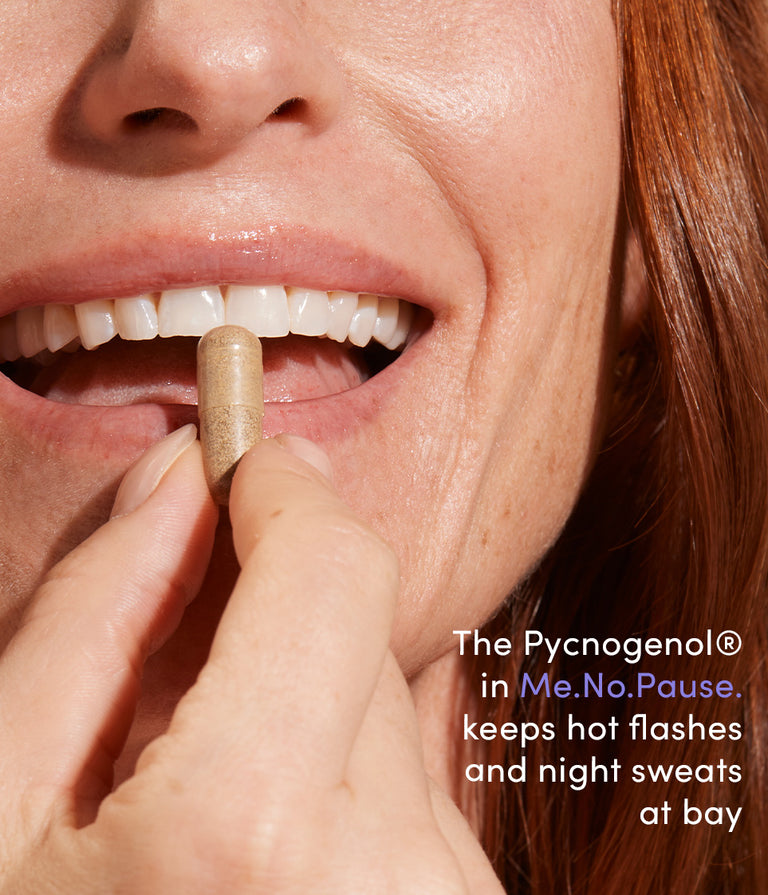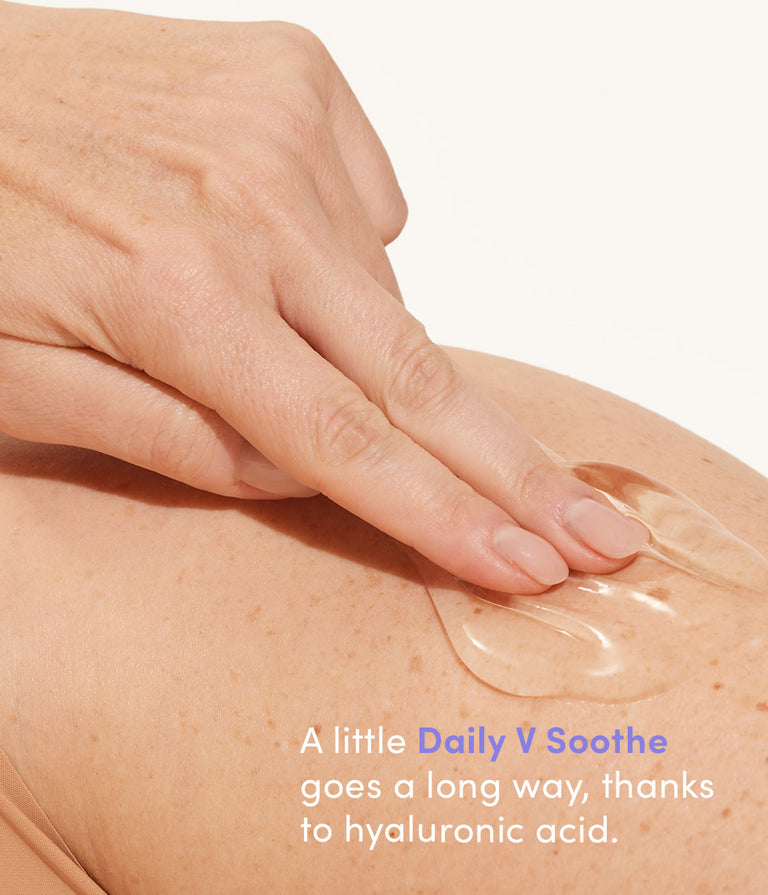By Womaness Editors 4-Minute Read

You're perhaps already familiar with major issues that menopause can bring your way. The lower libido. The hot flashes and night sweats. The dry skin (everywhere!). The weight gain. But did you know that bloating can be associated with it, too?
Always uncomfortable and, honestly, never welcome, bloating is that feeling of tightness or fullness in your abdomen, often accompanied by pain and increased gas or, yep, flatulence. And the connection between menopause and bloating is primarily driven by the hormonal changes that occur to you during this stage of life. Here's a deeper look at how the two are linked.
1. Hormonal Changes and Bloating
During perimenopause, the up to 10-year period leading up to menopause, you experience rapid changes in your hormone levels. This hormonal fluctuation, particularly the increase in your estrogen levels, can lead to water retention and gas retention...both of which can cause bloating. The shift in ovarian hormones during this period can also contribute to the bloating experienced by many women.
• Estrogen levels can influence your body's water and bile production, which can lead to bloating.
• Progesterone, another hormone that fluctuates during perimenopause, can slow down the digestive process, leading to a bloated feeling.
2. Dietary Factors and Bloating
Certain foods and beverages can exacerbate your bloating during menopause. These include beans, lentils, broccoli, dairy products, refined sugars, and fizzy or carbonated drinks. These foods are known to increase gas production, which can lead to bloating. That said, dietary changes can play a big role in helping manage your bloating during perimenopause, menopause, and beyond.
• Limiting alcohol and caffeine can help reduce bloating.
• Drinking lots of water and eating a diet rich in fiber and probiotics can help manage your bloating.
“Dietary changes can play a big role in helping manage your bloating during perimenopause, menopause, and beyond.”
3. Lifestyle Adjustments and Bloating
Making a few everyday adjustments can also influence the occurrence and severity of your bloating during menopause. Regular exercise, for example, can help stimulate the muscles involved in digestion, which can reduce the likelihood of bloating. Additionally, habits such as chewing gum and drinking carbonated beverages can lead to swallowed air...which can contribute to bloating! Smoking and drinking too much alcohol can also exacerbate bloating.
• Staying hydrated by drinking plenty of water can help prevent water retention, a common cause of bloating.
• Reducing your intake of processed foods can help manage bloating, as these foods often contain high levels of sodium, which can cause water retention.
4. Bloating or Weight Gain?
It's important for you to distinguish between bloating and weight gain during menopause. While both can result in a larger abdomen, they have different causes and manifestations. Hormonal changes during perimenopause and menopause can lead to weight gain, especially in the stomach area. On the other hand, bloating is temporary and often fluctuates throughout the day or around your menstrual cycle.
• Adopting a balanced diet, getting adequate sleep, and regular exercise can help manage both weight gain and bloating.
• Weight gain is more permanent and doesn't fluctuate throughout the day like bloating does.
5. Bloating and Health Risks
While bloating is a common symptom during menopause, it is important for you to pay attention to its frequency and severity. Occasional bloating is normal and can be managed with some dietary and lifestyle changes. However, if you've got prolonged or painful bloating, immediately address it with your doctor. That's because extended periods of bloating can indicate severe conditions like ovarian cancer.
• It's crucial to monitor the frequency and severity of bloating during menopause.
• Seeking medical advice is necessary if your bloating is prolonged, severe, or accompanied by other worrying symptoms.
“If you've got prolonged or painful bloating, immediately address it with your doctor.“
6. Postmenopause and Bloating
After menopause, bloating is more likely related to factors other than hormones. This could include dietary factors, lack of exercise, or underlying health conditions. While hormonal fluctuations are a primary cause of bloating during the menstrual cycle, these typically reduce after menopause. However, maintaining a healthy lifestyle is still crucial to managing bloating postmenopause.
• Postmenopause bloating can be managed with a healthy diet, regular exercise, and staying hydrated.
• It's important to consult your healthcare professional if bloating persists in postmenopause, as it could indicate an underlying health condition.
7. Bloating and Mental Health
It's true: The discomfort and distress caused by bloating can have a significant impact on a your mental health during menopause. The physical discomfort can lead to feelings of anxiety or depression, and the unpredictability of bloating can cause stress. Moreover, the changes in your body image associated with bloating and weight gain can also affect your self-esteem and overall emotional wellbeing.
• Seeking support from healthcare professionals, support groups, or mental health specialists can be beneficial in managing the emotional impact of bloating during menopause.
• Mindfulness techniques, such as meditation and deep-breathing exercises, can help manage the stress and anxiety associated with bloating.
Embrace Your Journey Through Menopause with Confidence
Understanding the connection between menopause and bloating is the first step towards managing this common symptom. Remember, menopause is a natural biological process, and the symptoms associated with it, including bloating, are simply part of this transition. By making informed dietary and lifestyle choices, you can significantly reduce bloating and enhance your overall well-being during this phase of life.
Recap: Navigating Menopause Bloating
• Hormonal changes during perimenopause can lead to bloating.
• Dietary factors, such as the consumption of certain foods and beverages, can exacerbate bloating.
• Lifestyle adjustments, including regular exercise and hydration, can help manage bloating.
• It's important to distinguish between bloating and weight gain during menopause.
• Prolonged or severe bloating should be addressed with a healthcare professional.
• Postmenopause bloating is more likely related to factors other than hormones.
• The emotional impact of bloating during menopause should not be overlooked.
Remember, you're not alone in this stage of life. Reach out to your doctor (or find one who specializes in menopause), join online support groups, and share your experiences with others going through the same phase. Your menopause journey is unique to you, and with the right knowledge and support, you can navigate through it with confidence. You deserve it.
More For You
Food to Eat (and Avoid) to Improve Menopause Symptoms
6 Foods to Help You Beat Perimenopause Bloating
The Midlife Middle






